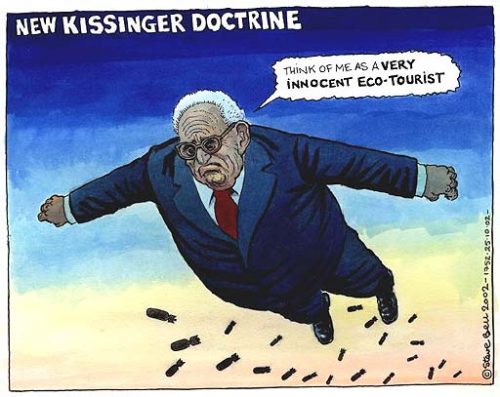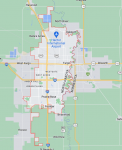Today is an evil birthday, a reminder that the universe is not fair and just.
Henry Kissinger is turning 100 this week, and his centennial is prompting assorted hosannas about perhaps the most influential American foreign policymaker of the 20th century. The Economist observed that “his ideas have been circling back into relevancy for the last quarter century.” The Times of London ran an appreciation: “Henry Kissinger at 100: What He Can Tell Us About the World.” Policy shops and think tanks have held conferences to mark this milestone. CBS News aired a mostly fawning interview veteran journalist Ted Koppel conducted with Kissinger that included merely a glancing reference to the ignoble and bloody episodes of his career. Kissinger is indeed a monumental figure who shaped much of the past 50 years. He brokered the US opening to China and pursued detente with the Soviet Union during his stints as President Richard Nixon’s national security adviser and secretary of state. Yet it is an insult to history that he is not equally known and regarded for his many acts of treachery—secret bombings, coup-plotting, supporting military juntas—that resulted in the death of hundreds of thousands.
The news, as usual, was sickening. Kissinger is generally treated as distinguished, honorable statesman, and his crimes are glossed over because, obviously, he’s a very old man and he’s celebrating a birthday. You don’t want to ruin his birthday, do you? (Yes, I do.) So the Washington Post runs a piece written by Kissinger’s son, David, that
tells us all about his secret for living so long — a diet heavy on bratwurst and Wiener schnitzel, a career of relentlessly stressful decision-making, and a love of sports purely as a spectator, never a participant.
He forgets never having a speck of empathy for others, and never ever facing the consequences of his decisions. He has seen some of those consequences, but they do not deter him.
As a refugee from Nazi Germany, he had lost 13 family members and countless friends to the Holocaust. He returned to his native Germany as an American soldier, participating in the liberation of the Ahlem concentration camp near Hannover. There, he witnessed the depths to which mankind can sink unconstrained by international structures of peace and justice. Next month, we will return to Fürth, where he will lay a wreath at the grave of his grandfather, who did not escape.
That’s so sad. If only the lesson he’d learned from his personal experience that murdering civilians is an evil act. At least the Intercept has a lengthy article on the civilian experience in Cambodia and Kissinger’s war crimes.
To Nixon and Kissinger, Cambodia was a sideshow: a tiny war waged in the shadow of the larger conflict in Vietnam and entirely subsumed to U.S. objectives there. To Cambodians on the front lines of the conflict — farming folk living hardscrabble lives — the war was a shock and a horror. At first, people were awed by the aircraft that began flying above their thatched-roof homes. They called Huey Cobra attack helicopters “lobster legs” for their skids, which resembled crustacean limbs, while small bubble-like Loaches became “coconut shells” in local parlance. But Cambodians quickly learned to fear the aircraft’s machine guns and rockets, the bombs of F-4 Phantoms, and the ground-shaking strikes of B-52s. Decades later, survivors still had little understanding of why they were attacked and why so many loved ones were maimed or killed. They had no idea that their suffering was due in large part to a man named Henry Kissinger and his failed schemes to achieve his boss’s promised “honorable end to the war in Vietnam” by expanding, escalating, and prolonging that conflict.
Kissinger doesn’t understand the meaning of “honor.” He’s a butcher who promoted the impersonal use of technology to lay waste to villages — he established an American tradition continued to this day, using drone strikes to wage bloody war with no clear idea how flattening farms and blowing up children will end a war.
Mother Jones summarizes Kissinger’s place in history.
It’s easy to cast Kissinger as a master geostrategist, an expert player in the game of nations. But do the math. Hundreds of thousands of dead in Bangladesh, Cambodia, and East Timor, perhaps a million in total. Tens of thousands dead in Argentina’s Dirty War. Thousands killed and tens of thousands tortured by the Chilean military dictatorship, and a democracy destroyed. His hands are drenched in blood.
Yet he will be feted today, and every simpering politician who praises this man is an accomplice.
I wish there were a grave that they could lay a wreath on, and that the rest of us could piss on.











